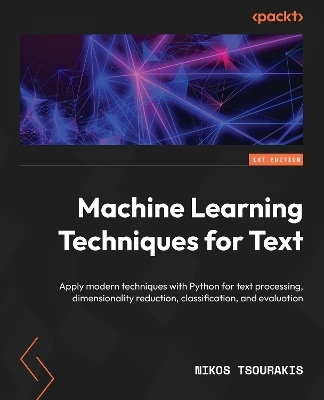
Machine Learning Techniques for Text
Packt Publishing Limited (Verlag)
978-1-80324-238-5 (ISBN)
Key Features
Learn how to acquire and process textual data and visualize the key findings
Obtain deeper insight into the most commonly used algorithms and techniques and understand their tradeoffs
Implement models for solving real-world problems and evaluate their performance
Book DescriptionWith the ever-increasing demand for machine learning and programming professionals, it's prime time to invest in the field. This book will help you in this endeavor, focusing specifically on text data and human language by steering a middle path among the various textbooks that present complicated theoretical concepts or focus disproportionately on Python code.
A good metaphor this work builds upon is the relationship between an experienced craftsperson and their trainee. Based on the current problem, the former picks a tool from the toolbox, explains its utility, and puts it into action. This approach will help you to identify at least one practical use for each method or technique presented. The content unfolds in ten chapters, each discussing one specific case study. For this reason, the book is solution-oriented. It's accompanied by Python code in the form of Jupyter notebooks to help you obtain hands-on experience. A recurring pattern in the chapters of this book is helping you get some intuition on the data and then implement and contrast various solutions.
By the end of this book, you'll be able to understand and apply various techniques with Python for text preprocessing, text representation, dimensionality reduction, machine learning, language modeling, visualization, and evaluation.What you will learn
Understand fundamental concepts of machine learning for text
Discover how text data can be represented and build language models
Perform exploratory data analysis on text corpora
Use text preprocessing techniques and understand their trade-offs
Apply dimensionality reduction for visualization and classification
Incorporate and fine-tune algorithms and models for machine learning
Evaluate the performance of the implemented systems
Know the tools for retrieving text data and visualizing the machine learning workflow
Who this book is forThis book is for professionals in the area of computer science, programming, data science, informatics, business analytics, statistics, language technology, and more who aim for a gentle career shift in machine learning for text. Students in relevant disciplines that seek a textbook in the field will benefit from the practical aspects of the content and how the theory is presented. Finally, professors teaching a similar course will be able to pick pertinent topics in terms of content and difficulty. Beginner-level knowledge of Python programming is needed to get started with this book.
Nikos Tsourakis is a professor of computer science and business analytics at the International Institute in Geneva, Switzerland, and a research associate at the University of Geneva. He has over 20 years of experience designing, building, and evaluating intelligent systems using speech and language technologies. He has also co-authored over 50 research publications in the area. In the past, he worked as a software engineer, developing products for major telecommunication vendors. He also served as an expert for the European Commission and is currently a certified educator at the Amazon Web Services Academy. He holds a degree in electronic and computer engineering, a master's in management, and a PhD in multilingual information processing.
Table of Contents
Introducing Machine Learning for Text
Detecting Spam Emails
Classifying Topics of Newsgroup Posts
Extracting Sentiments from Product Reviews
Recommending Music Titles
Teaching Machines to Translate
Summarizing Wikipedia Articles
Detecting Hateful and Offensive Language
Generating Text in Chatbots
Clustering Speech-to-Text Transcriptions
| Erscheinungsdatum | 03.11.2022 |
|---|---|
| Verlagsort | Birmingham |
| Sprache | englisch |
| Maße | 191 x 235 mm |
| Themenwelt | Informatik ► Theorie / Studium ► Künstliche Intelligenz / Robotik |
| ISBN-10 | 1-80324-238-8 / 1803242388 |
| ISBN-13 | 978-1-80324-238-5 / 9781803242385 |
| Zustand | Neuware |
| Informationen gemäß Produktsicherheitsverordnung (GPSR) | |
| Haben Sie eine Frage zum Produkt? |
aus dem Bereich


